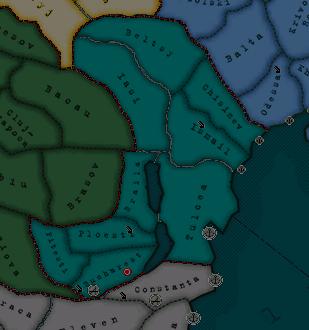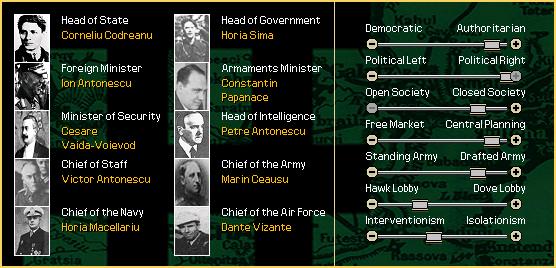Romania
From Kaiserreich
(→History) |
m (Reverted edit of Dinu, changed back to last version by Carmen510) |
||
| Line 48: | Line 48: | ||
== History == | == History == | ||
| - | Following | + | |
| + | Following Peace of Paris, concluding the [[Crimean War]] (1853 - 1856), the unification of Moldavia and Wallachia was expressly forbidden. However, due to a quirk in the procedure, '''Ioan Alexandru Cuza''' was elected Domnitor in both principalities, thus becoming first Prince of the United Principalities (1859 - 1866), to be followed onto the throne by '''Karl Eitel Friedrich Zephyrinus Ludwig von Hohenzollern-Sigmaringen''' (1866 - 1914), after a coup staged by the so called "Monstrous Coalition". After the 8th Russian-Turkish War 1877/78, which saw Romania fighting alongside [[Russia]], the country's sovereignty was recognized on the Berlin Congress of 1878. Southern Bessarabia was ceded to [[Russia]], while Romania gained Dobrogea. | ||
| + | |||
| + | In 1881 the Romanian Prince took the title of '''King Carol I'''. The orientation towards the West was secured, Russian influence lost its appeal. Carol I settled the Second Balkans War (1913) and joined the Quadrilateral with Dobrogea. With the outbreak of the [[Weltkrieg]] in 1914 Romania initially remained neutral, but joined the [[Entente]] in 1916, after Carol's successor, '''Ferdinand I''' ascended to the throne, only to be overrun in a few months by [[Bulgaria]] and [[Austria]]. In 1918 the government was forced to sign the Treaty of Bucharest, handing over the whole of Wallachia and Dobrogea and areas of the Carpathian peaks, as well as guaranteeing to supply [[Germany]] and Austria with oil for the following 90 years. | ||
| + | |||
| + | The treaty was never ratified and by the end of the [[Weltkrieg]], a new treaty consisting of milder terms was drawn. Romania ceded Oltenia to [[Hungary]] and Southern Dobruja to [[Bulgaria]]. Romania was allowed to keep Bessarabia from the remnants of the Russian Revolution, but the oilfields were leased to [[Germany]] until 2012. The king and government managed to stagger on until 1929, when '''[[Corneliu Zelea Codreanu|Corneliu Codreanu]]''' led the right wing Iron Guard in a coup d'etat, supported by the army. A military dictatorship, headed by Codreanu, was set up and began to remilitarize Romania. This invalidated the leasing of the oilfields to Germany and thus Romanian industry could benefit once again from cheap oil. | ||
== Politics == | == Politics == | ||
Current revision as of 14:13, 29 December 2016
| ||||
| Motto Totul Pentru Ţară (Everything for the Country) | ||||
| Anthem Deşteaptă-te, române! (Awaken, Romanian!) | ||||
 Romania and it's neighbors | ||||
| Official Language | Romanian | |||
| Capital | Bucharest | |||
| Head of State | Corneliu Zelea Codreanu | |||
| Head of Government | Horia Sima | |||
| Establishment (De Facto) Reunification of Wallachia and Moldavia | January 24, 1859 | |||
| - Officially recognised independence | July 13, 1878 | |||
| - National-Legionary State | 1929 | |||
| Government | Presidential republic | |||
| Currency | Romanian leu | |||
| Area | Approx 70 000 km² | |||
| Population | About 6 milions | |||
Romania, officially the Romanian National-Legionary State (Romanian short form: România; Romanian long form: Statul Naţional-Legionar Român) is a country in South-East Europe. It is governed by the Populist Iron Guard movement. It is usually called Iron Guard Romania. It is bordered by Galicia-Lodomiera to the north, Ukraine to the northeast, the Black Sea to the east, Bulgaria to the south and Hungary to the west.
Contents |
History
Following Peace of Paris, concluding the Crimean War (1853 - 1856), the unification of Moldavia and Wallachia was expressly forbidden. However, due to a quirk in the procedure, Ioan Alexandru Cuza was elected Domnitor in both principalities, thus becoming first Prince of the United Principalities (1859 - 1866), to be followed onto the throne by Karl Eitel Friedrich Zephyrinus Ludwig von Hohenzollern-Sigmaringen (1866 - 1914), after a coup staged by the so called "Monstrous Coalition". After the 8th Russian-Turkish War 1877/78, which saw Romania fighting alongside Russia, the country's sovereignty was recognized on the Berlin Congress of 1878. Southern Bessarabia was ceded to Russia, while Romania gained Dobrogea.
In 1881 the Romanian Prince took the title of King Carol I. The orientation towards the West was secured, Russian influence lost its appeal. Carol I settled the Second Balkans War (1913) and joined the Quadrilateral with Dobrogea. With the outbreak of the Weltkrieg in 1914 Romania initially remained neutral, but joined the Entente in 1916, after Carol's successor, Ferdinand I ascended to the throne, only to be overrun in a few months by Bulgaria and Austria. In 1918 the government was forced to sign the Treaty of Bucharest, handing over the whole of Wallachia and Dobrogea and areas of the Carpathian peaks, as well as guaranteeing to supply Germany and Austria with oil for the following 90 years.
The treaty was never ratified and by the end of the Weltkrieg, a new treaty consisting of milder terms was drawn. Romania ceded Oltenia to Hungary and Southern Dobruja to Bulgaria. Romania was allowed to keep Bessarabia from the remnants of the Russian Revolution, but the oilfields were leased to Germany until 2012. The king and government managed to stagger on until 1929, when Corneliu Codreanu led the right wing Iron Guard in a coup d'etat, supported by the army. A military dictatorship, headed by Codreanu, was set up and began to remilitarize Romania. This invalidated the leasing of the oilfields to Germany and thus Romanian industry could benefit once again from cheap oil.
Politics
Cabinet
Conducător: Corneliu Zelea Codreanu
Prime minister: Horia Sima
Foreign Minister: Ion Antonescu
Armaments Minister: Constantin Papanace
Minister of Security: Cesare Vaida-Voievod
Head of Intelligence: Petre Antonescu
Chieff of Staff: Ion Victor Antonescu
Chieff of Army: Marin Ceauşu
Chief of Navy: Horia Măcellariu
Chief of Airforce: Dante Vizante
Party system
One party: The Legion of the Archangel Michael, also known as the Iron Guard.
Military
The renovated Romanian Army comprise nine infantry divisions (with various brigades attached), two outdated cavalry divisions and a couple of militias.
The Romanian Navy, stationed in the Black Sea, consist only in one destroyer and a very outdated submarine.
The Romanian Air Force can count on one squadron of interceptors, one of tactical bombers and one of naval bombers, even if none of them is fully crewed and equipped.
Foreign relations
Friendly relations with Greece, Serbia and Ottoman Empire.
Unfriendly relations with Bulgaria and Austria-Hungary.


